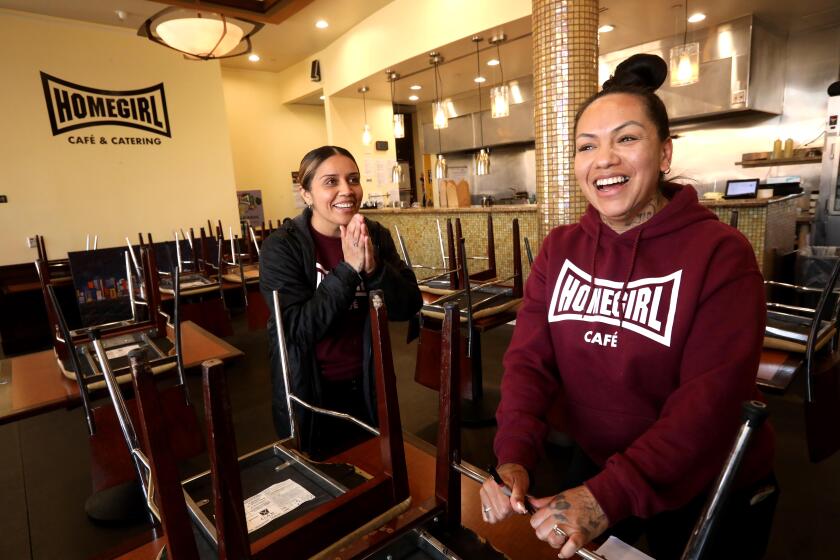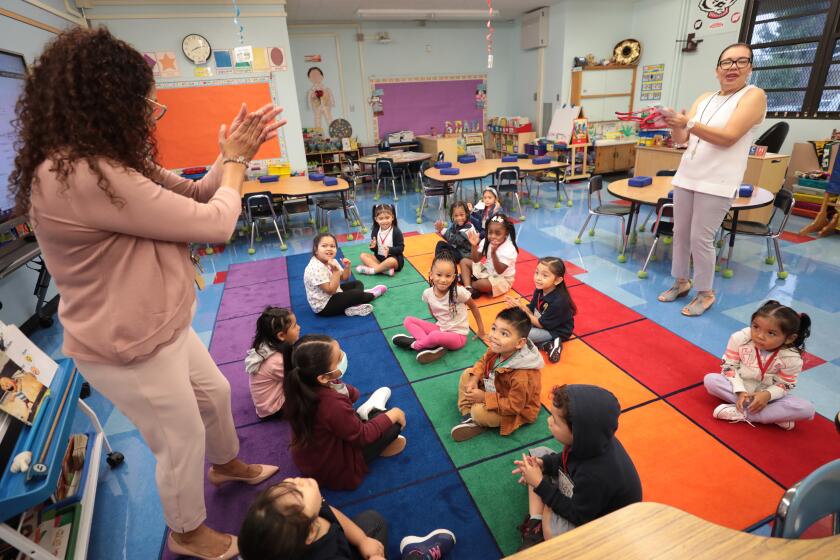Tribes Seeking Casinos Offer to Share Funds
As new Indian casinos sprout around the state, some tribes have adopted a new tactic to win over wary local community leaders: They’ve anted up a slice of their gambling revenue.
A Sonoma County tribe recently became the latest, and biggest, example of this new approach. The Federated Indians of the Graton Rancheria are offering the county and the city of Rohnert Park, which sits beside the proposed 360-acre casino and resort site, $320 million to assuage the effects on traffic, police, fire and other municipal services.
“This is unprecedented in terms of revenue sharing,” said Rohnert Park Mayor Armando Flores. “We’re very enthusiastic.”
The Sonoma County deal follows several other agreements struck around the state between local governments and tribes attempting to build new casinos or expand old ones. While the agreements risk the appearance that tribes are buying off elected officials, they have been embraced by leaders rattled by dwindling tax revenues as the economy continues to lurch.
Last year, the Rumsey Band of Wintun Indians hatched a $100-million pact with Yolo County officials to offset the effects of their expanding casino in the rural Capay Valley. More recently, state lawmakers pushed through compact agreements with three Southern California gambling tribes that include revenue sharing to offset expenses incurred for police and other services.
So far, 11 tribes have struck such “community services contracts” with counties or cities, said Cheryl Schmit of the gambling watchdog group Stand Up for California. Only four of those, however, can be considered “comprehensive,” Schmit said, covering the gamut of municipal issues that can be affected by a casino. Among these are effects on roads, water, sewage, law enforcement, jails, groundwater, open space and liability.
And the Rohnert Park deal, Schmit said, is the best yet.
“I certainly think the tribe is being fair in this instance,” Schmit said. “My concern is how the city arrived at that dollar figure -- what research went into it.” She also worries that a community risks “becoming addicted to the gaming revenue.”
In Sonoma, there has been a political toll for elected officials who supported the casino proposal. Outraged by the deal, a cadre of gambling foes has launched a recall effort against the Rohnert Park City Council, as well as three county supervisors.
“They’re going to put this turkey smack dab in the middle of a flood plain just outside the city limits. It’s terrible,” said Pastor Chip Worthington of the Rohnert Park Assembly of God Church. “We have a family town, and it will destroy the city.”
“This is a 100% sellout,” said Anita Felton, another casino foe. “People are upset. The citizens are not going to give up the fight.”
Felton said the ballyhooed revenue-sharing agreement simply isn’t that good a deal. She noted that card clubs in one Bay Area city pay 13% of their take in taxes. If such a cut were applied to even the most conservative income projections for the Rohnert Park casino’s slot machines, the tribe would fork over about $480 million -- 50% more than it now is offering the county and city.
In Connecticut, two huge Indian casinos hand over a quarter of their slot revenue to the state. California, however, didn’t adopt such a revenue-sharing scheme when voters approved Indian gambling, leaving local cities and counties to strike their own deals.
As its deal is now envisioned, Rohnert Park would receive $200 million spread over 20 years, while the county would receive $120 million over the same period. The county has yet to approve any deal and remains in negotiations. But the City Council last week gave tentative approval and is set on Oct. 14 to ratify the pact, which includes giving a large portion of the funds to local charities.
“Some people are looking at it as if we’re trying to buy our way in,” said Greg Sarris, Graton tribal chairman. “But this has been our plan from Day 1. My belief is, if other tribes around the state don’t start working more closely with the counties and cities, down the road we could see a voter revolt.”
The 557-member tribe originally planned to build a resort and casino on 2,000 acres of ranchland near the edge of San Francisco Bay, but dropped that plan after intense opposition from citizens, Sonoma County officials and Sen. Dianne Feinstein (D-Calif). Over the summer, the tribe checked scores of new sites and chose the spot on Rohnert Park’s south side.
Plans call for a 2,000-slot casino, a 300-room hotel, a performance hall, a spa and other resort amenities. The development would cover 50 to 60 acres with the rest left open, Sarris said. The 2,000 acres purchased in southern Sonoma County by the tribe and its partner, Station Casinos of Las Vegas, would be dedicated as open space.
Flores said the tribe has attempted to be a good neighbor. Given its sovereign status, “the tribe had no obligation at all to help us,” the mayor said. “The choice for the council was to either take a $200-million offer or walk away. It would have been irresponsible to walk away.”
More to Read
Start your day right
Sign up for Essential California for news, features and recommendations from the L.A. Times and beyond in your inbox six days a week.
You may occasionally receive promotional content from the Los Angeles Times.






